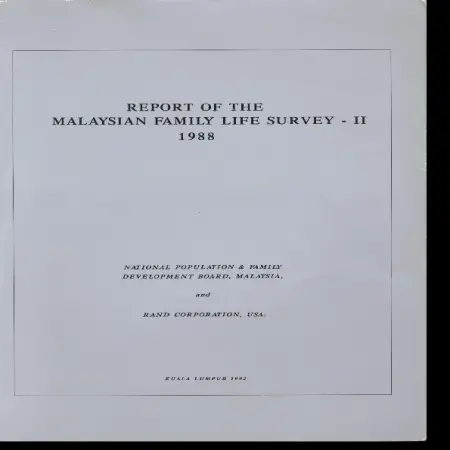Browse by Subject
Results for Search : "301 Sociology & anthropology"
|
|
Peranan sosialisasi ibu atau bapa komuter dipermudahkan dengan bantuan teknologi gajet dan media sosial: kajian kes di bangunan Ibu Pejabat LPPKN
Item Type: Thesis
Editor:
Year: 00/00/2018
Abstract: This study looks into the role of parents as the socialisation agent for their children in the lives of commuter families, which refers to the parents who do not live with their children due to distance and occupational demands. The rapid development of gadgets and social media technology such as the development of smart phones and
web 2.0 has allowed online social interactions made possible and can be used as a medium of change in being able to connect people who are at a distance from each other as seen in the case of commuter children and their parents. This study looks closely at how gadgets and social media technology helps parents of commuter families who work specifically at the LPPKN headquarters building and the role it plays
as a socialisation agent for their children. There are three research objectives in this study and they are as follows i) to explore the usage of gadgets and social media technology by parents in commuter families, ii) to identify the parenting style that is practiced by parents in commuter families when interacting with their children, iii) to analyse the effects of gadgets and social media technology on the role of parents in commuter families as the socialisation agent for their children. This study uses the qualitative approach through in-depth interviews and non-participant observation there are 10 participants involved in this study that was selected using purposive sampling. The symbolic interactionism and dramaturgy theory was used to explain the role of
gadgets and social media technology to the parents of commuter families and in helping them to understand their role in the socialisation of their children. Results from the study has shown that the use of gadgets and social media technology has definitely aided parents in commuter families' role in being the socialisation agent for their
children through online interactions. Other results include gaining insight to the authoritative parenting style that is executed in a democratic nature of commuter family parents and their consciousness towards the needs of their children. Besides that, the study has shown that gadgets and social media technology has given a positive effect towards parents of commuter families' role in being the socialisation agent for their children, in that it strengthens the bond and interactions between parent and child. This study has found that the use of gadgets and social media technology has enabled parents of commuter families to exercise their socialisation responsibilities towards their children through means of educating them and instilling moral values.
|
|
|
|
|
|
Relationship between family functioning, parenting behaviour, self-efficacy, and gender on risky behaviour amongst adolescents in Kuala Lumpur, Malaysia
Item Type: Thesis
Editor:
Year: 00/00/2018
Abstract: Adolescence is the developmental period marked by a rise in risk-taking behaviours. The high rate of adolescents’ involvement in risky behaviours in the past decades has created a vast amount of attention on the impact to their future. In Malaysia, the impact of risky behaviour has been alarming as evidenced by the media reports on baby dumping, unwanted pregnancies, drug addiction and juvenile delinquency. The increasing trend of adolescents’ involvement in risky behaviour may be associated with social- and self-factors. The current study was conducted to investigate the relationship between family functioning, parenting behaviours, self-efficacy, and gender on risky behaviours amongst adolescents in Kuala Lumpur, Malaysia. This quantitative study utilised a descriptive and correlational research design. Data were collected using self-administered questionnaires. A total of 411 adolescents aged 15 to 18 years were recruited as respondents. Six instruments were used namely the Family Perception Scale, the Parental Monitoring Scale, the General SelfEfficacy Scale, the Adolescent Alcohol and Drug Involvement Scale, the Adolescent Sexual Activity Index, and the Self-Reported Delinquent-Problem Behaviour Frequency Scale to measure the respective variables. Descriptive, bivariate, and multivariate statistics were used in analyses to address the specific objectives of the study. The study found that 12.6% of adolescents reported engagement in substance use, 47.2% in risky sexual behaviour, and 52.1% in delinquency. The independent t-test analysis showed that the proportion of male adolescents who engaged in substance use was higher compared to female. There were no significant differences between male and female in risky sexual behaviour and delinquency. Findings of this study showed that self-efficacy only moderated the relationship between parental monitoring and substance use, whereby the effect is strongest among adolescents with low self-efficacy, and weakest among adolescents with high self-efficacy. This suggested that there is low risky for adolescents to involve in substance use if the adolescent has higher level of self-efficacy. Meanwhile, gender only moderated the relationship between parental monitoring and risky sexual behaviour, whereby the effect is stronger among male adolescents compared to female adolescents. This suggested that male adolescents tend to involve more with risky sexual behaviour compared to female adolescents. The present study conclude that family functioning (family cohesion, communication), parenting behaviour (parental monitoring and parental involvement), self-efficacy and gender influence risky behaviours (substance use, risky sexual behaviour and delinquency) amongst adolescents in Kuala Lumpur. The findings has implication for parents as well as individuals and professional working with adolescents. Parental monitoring was significantly correlated with substance use thus parents were suggested to provide appropriate monitoring to increase awareness that their involvement is crucial in reducing adolescents’ substance use. They also need to be equipped with appropriate skills to establish high quality relationship with their adolescent children. The finding also call for intervention to provide adolescents with necessary skills to help them avoid being involved in risky behaviour.
|
|
|
|
|
|
Sosialisasi dan kawalan sosial dalam kehidupan remaja berisiko: kajian kes di projek Perumahan Rakyat (PPR) Sri Pahang, Bangsar dan Sri Pantai, Lembah Pantai, Kuala Lumpur
Item Type: Thesis
Editor:
Year: 00/00/2015
Abstract: This study focused on a group of adolescents categorized as adolescents at risk in the People's Housing Project (PPR) area in urban areas. Purpose of the study is to identify and understand the life patterns of at -risk adolescents includes their involvement in deviant behavior, the role of socialization agents and forms of social control in the lives of at -risk adolescents. This study uses design qualitative form using in -depth interview and observation methods did not participate. A total of 10 teenagers consisted of six boys and four women aged between 16 to 22 years from PPR Sri Pahang, Bangsar and PPR Sri Pantai, Lembah Pantai have been purposefully selected.
|
|
|
|
|
|
Gaya hidup wanita dan faktor risiko kanser payudara: satu kajian literatur
Item Type: Article
Editor:
Year: 00/00/2015
Abstract: Breast cancer is currently the most common cancer in women worldwide. It is said that there is no proven method of preventing cancer. However, studies have shown that there are some women’s lifestyle factors that have been scientifically shown to increase the risk of breast cancer. A review of the literature from the epidemiological, medical, and psychosocial disciplines strives to analyse factors that tend to increase the risk of developing breast cancer. Published material reviewed concerning the connection between breast cancer risk and lifestyle factors such as diet and physical activity. This review shows that several women’s
lifestyle factors have been regularly considered as risk factors for developing breast cancer. They include women who have not had children or women who had their first child at an older age, short duration of brestfeeding or not breastfeed at all, diet and nutrition, and psychological stress.
|
|
|
|
|
|
Report of the Malaysian Family Life Survey-II 1988
Item Type: Research Report
Editor:
Year: 00/00/1992
Abstract: MFLS-2 was, in part, a follow-up to the original Malaysian Family Life Survey, fielded in 1976-1977, reinterviewing original respondents and their adult children, plus interviewing a new group of women age 18-49 in 1988. The information that is collected are household-level retrospective and current data from women and their husbands, covering such topics as fertility, nuptiality, migration, mortality, employment, household composition, transfers, and income as well as social, economic, and community-level factors affecting family decision making. MFLS-2 added a sample of older Malaysians to support research on their living standards, health, and intergenerational transfers.
|
|
|
|









